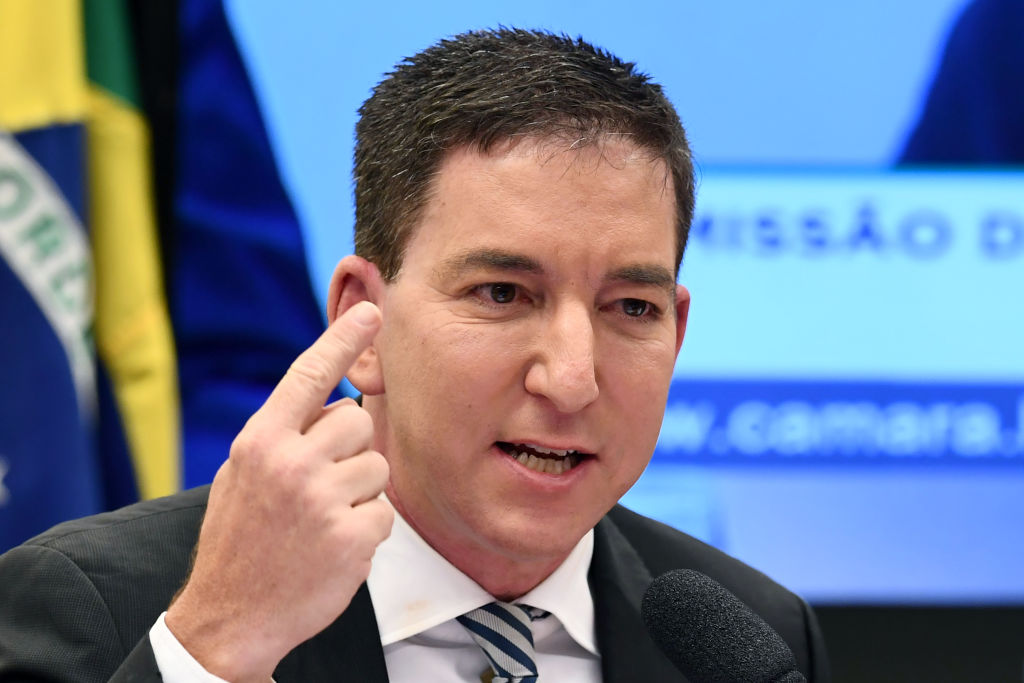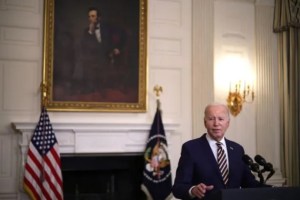Glenn Greenwald wants right-wing populists to understand that the CIA is not their friend.
On Sunday thousands of Cubans swarmed the streets of Havana amid ongoing blackouts, food shortages and rising prices. Increasing COVID infections have strained the island’s healthcare system and put medical care at a standstill. The protests are the largest of their kind in over a decade. In turn, the government began a crackdown. More than 100 activists and journalists are reportedly in custody. One male protester was shot in his home on Wednesday during a police raid. Facebook and Twitter played a crucial role in allowing the rest of the world to witness the unrest — so of course the Cuban government has banned those platforms in the last 72 hours.
Almost unanimously, GOP lawmakers in the last few days have thrown their support behind the anti-communist protesters, including Sen Ted Cruz of Texas, Sen. Marco Rubio of Florida and 2024 hopeful Florida governor Ron DeSantis.
In an interview with The Spectator, journalist Glenn Greenwald broke down why he believes ‘America First’ conservatives should reevaluate their support for Cuba’s protests. The Intercept co-founder argues that conservatives with nationalistic tendencies should prioritize American domestic policy without embroiling themselves in foreign conflicts.
PN: Why shouldn’t conservatives who describe themselves as ‘America First’ support protests in Cuba and abroad?
GG: Well, if you go back and look at the leader of the kind of contemporary America First movement, which is obviously Donald Trump when he was outlining his foreign policy in 2016, it was very much against the idea that the United States should be involved in regime change operations to help other countries. At the time, the big debate was over Syria. That was one of the big differences between himself and Hillary Clinton on foreign policy. She argued that Bashar al-Assad is a hideous dictator, and we should go in to at least set up no-flyzones in Syria or strengthen the CIA further to overthrow Assad and bring freedom and democracy to the Syrian people. Trump’s argument was, ‘why do we have any interest at all in using our money and the lives of our soldiers to go and fight tyranny in Syria? How is that going to help steelworkers in Ohio, in Pennsylvania to go use our resources to go fix the government in Syria?’
So that’s been the core of the argument, which is we have no right to be interfering in other countries and intervening in other countries to try and quote-unquote, fix them or help them or change their government. Every time we’ve tried, it’s been a disaster. Our resources are better spent on helping Americans and not foreign nationals. It seems very inconsistent to me for people who have been advocating that to now turn around and use the neocon liberal interventionist argument to say we need to bring freedom and democracy to Cuba and liberate the Cuban people.
PN: Yet, Cuba is different from Syria because it’s directly on America’s border. If violence accelerates in that region, it would directly affect American immigration. So why shouldn’t they take an interest?
GG: Well, if that’s the argument, then you would want to avoid instability in Cuba, not fuel it. The reason the United States supports the Egyptian despots and Saudi despots is exactly for that reason. We want stability there. We don’t care about democracy. Democracy is messy and unstable. Our interests are served with stability. So if your argument is true, we want to make sure that everything is stable. Why would you support regime change? Nothing brings instability to a country more than regime change.
And the other thing I would say is, how far out does that go? Does that mean we should be dictating the governments of Mexico and Central America and South America from which a lot of immigrants come? It seems like a pretty daunting task for a country that can’t even provide a subway that doesn’t flood in New York City. I don’t see how stability is an argument. The US government, when it intervenes, brings instability, not stability.
PN: Your criticism is that ‘America First’ conservatives are getting involved in a foreign conflict. But why is that mutually exclusive with their principles? Is it not ‘America First’ to oppose people who hate us like Cuba and Hamas and therefore support the people against them?
GG: I would say that if they were threatening the United States in some way, then yeah. I mean, that’s the idea of the military — use the military for self-defense. But Cuba is a tiny little island that has been besieged for seven decades by the United States. Cuba has no power, no ability to harm the United States. Just like Hamas has no power or ability to harm the United States. Nobody thinks the US is arming Israel against Hamas because Hamas will harm the US. Everyone knows that the United States is doing that because Israel has a lot of political influence towards the US because it’s a really important ally in the region.
It’s a very kind of circular argument. Why do these countries hate the United States? Why does Hamas hate the United States? It’s because they know that their oppressor, the country they perceive to be their oppressor, is supported, armed and funded by the United States. Why does Iran hate the United States? Because they know that it was the United States that overthrew their democratically elected government. Why does Cuba hate the United States? Because they know that it’s the United States that has been embargoing and strangling their country for decades. We interfere in their countries. They then hate us. And we then use that hatred as reasoning to keep interfering. So if anti-Americanism is your worry, you should really be interested in having the United States stop interfering in other countries. That is a big cause of anti-Americanism. We sacrifice our own national interests in order to interfere in other countries.
PN: Ron DeSantis proposed working with private companies to give Cubans access to free internet after government restrictions this week. What does this say about the populist right’s future if a significant contender for 2024 supports an interventionist policy?
GG: The fact that Ron DeSantis wants to intervene in Cuba doesn’t necessarily mean that the MAGA movement is retreating from its anti-interventionist position because it could just be a cynical, political calculation. You can’t survive in Florida politically if you don’t take that position. Nonetheless, my job as a journalist is not to make excuses for politicians.
It’s almost a reflexive reaction. If you’re on the right, almost automatically you hate communists, right? So the minute you see people protesting against communism, your reflex is to side against the communist government, but there’s this kind of new Republican ideology that Trump brought to the floor. It was already lurking with Ron Paul, who was very isolationist as well. If you asked him, I’m sure Ron Paul would say the US should stay out of Cuba. But Trump brought it to the floor, so it’s kind of a new ideology, and it’s just all of the clash between these new beliefs and old instincts that kind of activate almost like a reflex. And I think that’s really what happened.
PN: Do American technology social media platforms play a role in expanding American interventionist policies, especially regarding Cuba?
GG: It’s a huge part. Hillary Clinton had those two little tweebs working for her. Alec Ross and Jared Cohen, whose job was to figure out how to exploit the internet to destabilize the regimes that the US was adversarial to. In 2011, they created a whole fake Twitter that made it look like it was a real Twitter, but it was actually just designed for the CIA to spread disinformation in Cuba to destabilize the government. So that’s one reason why these countries shut out the internet. I’m not defending it. I’m just saying that one of their motives is they know it’s not just their own people who will use the internet, but their external enemies led by the United States are going to do so.
Really ironic, right? What was the scandal of 2016 about? It was that Russia used the internet to sow chaos, disorder and affect the election. It’s such a projection on the part of the US government. That’s what the US government’s main strategy is when it comes to foreign policy. So, you know, there are lots of different ways to interfere in countries. We always have disseminated misinformation and just information and propaganda in other countries. And the internet is a perfect tool. So it is central to what the US government tries to do.
PN: Why should conservatives care if the CIA is subversive abroad?
GG: The last five years of discourse on the right have been about the CIA’s evils and the Deep State. Why would you want to unleash people like that and empower people like that to interfere in other countries? Do you actually think these evil people are going to produce benevolent and positive outcomes? I don’t. I don’t trust the intelligence community, and therefore, I’m generally opposed to empowering them. Ultimately, the way you put America first is by looking inward, focusing on the welfare of your own citizens, and then protecting your borders and your country from attack. Anything beyond that seems inconsistent with that worldview.
PN: Do you see any hypocrisy in how Republicans and Democrats have reacted to the protests?
GG: I think there’s hypocrisy with both parties currently denouncing the Cuban government because during the protests of 2020 protesters were burning down police stations. Democrats were denouncing the use of force to do that, while Republicans were cheering it. So, for Republicans to have urged the suppression of protests in 2020 and then to condemn the Cuban government for trying to impose order is clearly an inconsistency. I think the same is true of Democrats. Democrats want the people in the Capitol riot, including those who didn’t use violence, to be held in prison with no bail, even before they were convicted of anything. They support the shooting of Ashli Babbitt, who was an unarmed protester. And they want to accuse other governments and denounce other governments for doing much less.
I think the biggest hypocrisy is that both Republicans and Democrats support and prop up and arm tyrannies and despots who are worse than the Cuban government by every metric, including Egypt and Saudi Arabia, which routinely imprison journalists and kill dissidents and gun down protesters in the streets. So it’s always been kind of confounding to me how people who want to support the most savage dictators in the world then want to turn on a dime and pretend they’re the human rights defenders by condemning other despots and other dictators on human rights grounds. I wish they would be honest and say, ‘We like the dictators who are pro-American, but we don’t like the ones who are anti-American.’ That will at least be an honest framework and a rational one, not a very moral one, but a cogent one.
PN: How should conservatives leaders and Trump’s America First’ conservatives react to the Cuban protests?
GG: I think criticizing other countries and governments is fine. You can have an opinion, but I think the idea should be: who rules Libya is for Libyans to decide, who rules Syria is for Syrians to decide, who rules Iraq is for Iraqis to decide, who rules Cuba is for Cubans to decide. And if the Cuban people want to overthrow their government, that’s up for them to do it, and I’ll stand by, and I’ll cheer for them, and I’ll root for them. But I don’t think it’s the role of my government to interfere in Cuba because it doesn’t pose any threat to the United States.
This transcript has been edited for length and clarity.


















